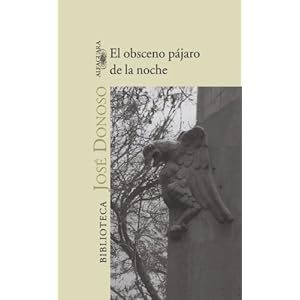 El obsceno pájaro de la noche (The Obscene Bird of Night) - José Donoso
El obsceno pájaro de la noche (The Obscene Bird of Night) - José DonosoA canonical work of Chilean literature, and a novel that consolidated Donoso as a key figure in the new wave of Latin-American fiction, The Obscene Bird of Night is a strangely inducing and intriguing work.
This is a polyphonic novel of multiple voices that all come from the same character: Humberto Peñaloza, otherwise known as 'Mudito' (The Mutey). There are numerous threads of narrative that Mudito narrates, and numerous narrative voices and personalities he adopts. Hiding under the alias of 'Mudito', he languishes in the recesses of an enormous institution that for the most part houses decrepit old women and a few young orphans. Here he follows Iris, who is a teenage girl who the old women accost and and prompt her onto giving a 'virgin birth', and she is endlessly impregnated for years. Mudito, we are to find when we have delved well into the core of the novel, is a person called Humberto Peñalosa who is a middle-class law student with literary pretensions. He becomes assistant to the aristocratic Jerónimo Azcoitía, a powerful senator and former socialite. Jerónimo's wife, Iris, is a woman who frequents the old women's home and much to her husband's annoyance, has a relationship with a 'witch' called Peta Ponce. There is a scene where Peñalosa has sexual intercourse with Iris, but is in fact an act of witchcraft between him and Peta Ponce that ultimately produces a mutant child simply named 'Boy'. Azcoitía decides to build an enormous kingdom that only houses 'Freaks' and monsters, thus bringing up Boy in a place where deformity and monstrosity is the norm and conventional notions of beauty non-existent. Peñaloza is put in charge of the kingdom, and he becomes the abnormal one inthis vast world of deformity, where he ensures that Boy has no contact with the outer world whatsoever. However, he is deceived by Azcoitíá and extirpated of "80%" of his body because, as Peñaloza informs us, he discovers about the promiscuous act with Iris. This is when his individuality and characteristics are annihilated and he spends his remaining days in the catholic church housing the old women that's soon to be destroyed. Iris comes back claiming for the beatification of her former ancestor of the same name, and she undergoes medical treatments that make her age considerably. By no means does all this happen chronologically and linearly; Donoso often zig-zags through time and alternates between all these plot strands. Peñaloza is either the miracle baby the old women accost, a law student, secretary to a wealthy politician, a nun or a mute servant.
Donoso centres Humberto Peñaloza around the 'Imbunche' myth originating from an isolated island in Chile called Chiloe. Chiloe is an island that was segregated from the rest of Chile for a number of years and thus developed its own culture and mythology. After reading the novel I have read up on this and found that 'Imbunche' is the process of an implosion of the physical and intellectual self that turns the living being into a thing or object deprived of any individuality. Peñaloza's character is depleted and he is left as an existing thing that's completely secluded from the outside world, left languishing in his own nightmares and interior monologues.
The world of the Chilean working classes is what Donoso is carving out in this novel. Born to a wealthy upper-class family, Donoso found a whole underworld of intrigue in the stories and mythologies of maids and old women. Inés, a wealthy and prominent woman, eventually becomes Peta Ponce, the witch who acts as a servant for her. While I lived in Chile as a youngster, I was also intrigued by the seemingly different world these working class people inhabited.
The novel is an endless tangle of past and present; the subjective perspectives are by no means coherent, often alternating between different times and narratives. There is also an ambiguity between the identity of characters; in one of the earlier moments of the novel, it is not clear who is having sex with Iris as Mudito appropriates the mask she insists everyone wear while carrying out the act, as if it were out-of-body experience.
Additionally, the use of language is apt: the sentences are endlessly long, with paragraphs often running for pages and pages. This is usually the case when they're Mudito's interior monologues, which are bound to be incoherent.
This is, really, many books... It is very hard to summarise, resulting in the hardest review I've had to write for this blog. This is a darker and crazier side of magic realism, a perverse and crazy world of freaks and monsters and the underbelly of Chilean culture and mythology.
-------------
I wrote the first half of this review on Friday the 10th, but completed it on Sunday the 12th.
No comments:
Post a Comment